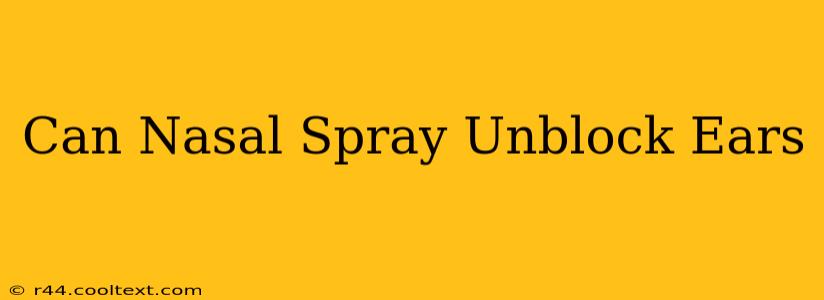Can Nasal Spray Unblock Ears? Understanding Eustachian Tube Dysfunction
Experiencing that annoying clogged feeling in your ears? Many people wonder if a simple nasal spray could offer relief. While it's not a guaranteed solution, nasal spray can sometimes help unblock ears, but it's crucial to understand why and when it might work. This article explores the connection between nasal congestion, ear pressure, and the effectiveness of nasal sprays in relieving ear blockage.
The Link Between Your Nose and Your Ears
The key lies in the Eustachian tube. This small, narrow tube connects your middle ear to the back of your nasal cavity. Its primary function is to equalize pressure between your middle ear and the outside environment. When you have a cold, allergies, or a sinus infection, inflammation and swelling can block this tube. This blockage prevents pressure equalization, leading to discomfort, a feeling of fullness, or even pain in your ears – a condition often called Eustachian tube dysfunction (ETD).
How Nasal Spray Might Help
Nasal sprays, particularly saline (saltwater) sprays and decongestant sprays, work by reducing inflammation and swelling in the nasal passages. By shrinking swollen nasal tissues, they can indirectly open up the Eustachian tubes, allowing for better pressure equalization. This can alleviate the feeling of blocked ears.
- Saline Nasal Spray: This gentle option helps to moisturize and clear nasal passages, which can be beneficial for mild ETD. It's generally safe for regular use.
- Decongestant Nasal Spray: These sprays contain medications like phenylephrine or oxymetazoline that constrict blood vessels, further reducing swelling. However, overuse of decongestant sprays can lead to rebound congestion, making the problem worse in the long run. Always follow the instructions on the label and avoid prolonged use.
When Nasal Spray Might NOT Help
It's important to remember that nasal spray isn't a miracle cure for all ear blockages. If your ear blockage is caused by something other than nasal congestion, such as:
- Ear infection (otitis media): This requires medical attention and antibiotics.
- Fluid buildup in the middle ear: This may need treatment with ear drops or other medical interventions.
- Serious underlying medical conditions: Consult a doctor for persistent or severe ear problems.
Other Ways to Unblock Ears
Besides nasal spray, several other methods can help relieve ear pressure and unblock ears:
- Yawning or swallowing: These actions can help naturally open the Eustachian tubes.
- Valsalva maneuver: Gently blowing air out of your nose while pinching your nostrils shut (use caution and don't overdo it). Consult a doctor if you are unsure how to perform this safely.
- Over-the-counter pain relievers: Ibuprofen or acetaminophen can help reduce pain and inflammation associated with ear pressure.
When to See a Doctor
If your ear blockage persists despite trying home remedies, or if you experience:
- Severe ear pain
- Fever
- Hearing loss
- Drainage from your ear
- Vertigo (dizziness)
Seek medical attention immediately. A doctor can properly diagnose the cause of your ear blockage and recommend the appropriate treatment.
In Conclusion: While nasal spray can sometimes alleviate ear blockage by reducing nasal congestion, it's not a guaranteed solution and shouldn't be considered a replacement for medical advice. Understanding the underlying cause of your ear blockage is crucial for effective treatment. Always consult a healthcare professional if you have persistent or severe ear problems.

